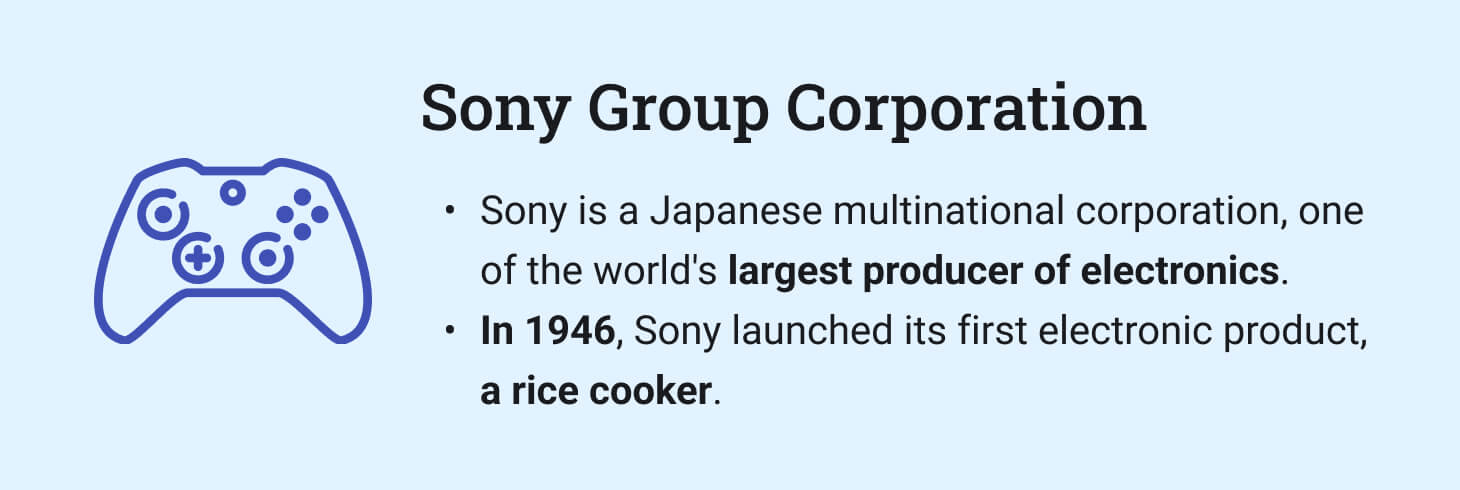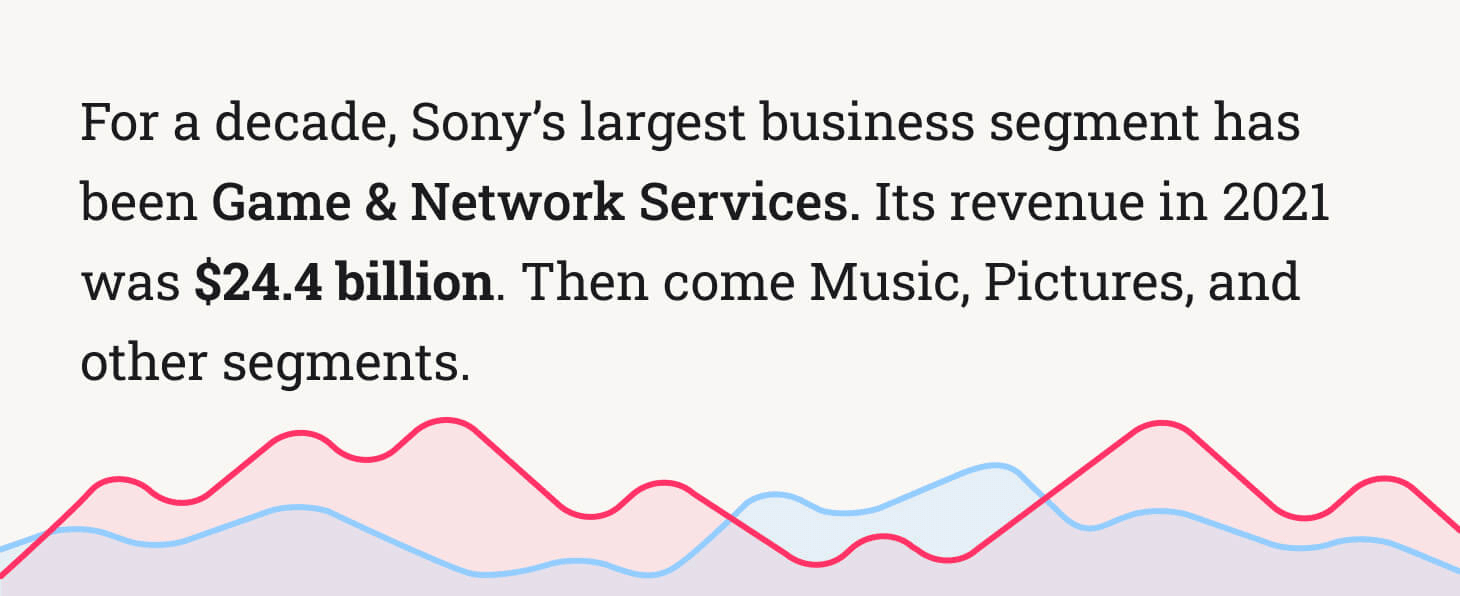
Did you know that in 2021 Sony made 1.42 billion U.S. dollars from its music publishing segment? This unbelievable success made Sony one of the “Big Three” record companies, along with Universal Music Group, followed by Warner Music Group. There are numerous lessons a student can take from doing a Sony case study, and we are here to help!
🔔5 Mind-Blowing Facts About Sony
- Sony Entertainment Inc is a part of a Japanese multinational corporation that creates video games and professional consoles.
- When founded in 1946, the company initially produced a rice cooker, which was a business failure.
- One day an opera student complained to the owners about the sound quality of Sony’s audio recorders. They were impressed with the critique and hired him to join the team.
- Sony is strongly associated with innovations. For example, Sony originally developed CDs, DVDs, and Blu-ray discs.
- An essential part of Sony’s strategic management is its global employment. Now they have over 114,000 employees from all over the globe.
💡 Best Ideas for a Sony Case Study
Various elements contribute to the company’s success: community, core values, dedicated employees, and consistency. When doing a Sony case study, you can focus on a particular topic that interests you. For example:
- History of Sony Group Corporation.
- Main Sony’s formats and technologies.
- Sony’s corporate values and mission.
- Sony’s employee networks.
- Principal marketing strategies in Sony.
- The system of finance in Sony.
- Sony’s management style.
- Sony’s customer support system.
- Critical business units that exist in Sony.
- Sony’s environmental impact.
- Sony’s basic policy of CSR.
- Sony’s corporate citizenship.
- Sony’s community engagement.
- Sony’s career opportunities and internship programs.
- Sony’s benefits and career perks.

🗂️ Sony Case Study Idea #1 – Company Organization
- Sony’s business divisions
In its organizational structure, Sony has divisions based on product type. Now the company focuses on three main business segments:- Devices, games, and network services
- Pictures
- Music
Flexibility is the key advantage of Sony’s organizational structure. Each business segment focuses on particular market demand to make customers happy with the products.
- Sony’s geographic divisions
Sony is a multinational company, which is headquartered in Tokyo. It has 61 offices across 46 countries, making geographic divisions important. The company uses geographic divisions for finance, strategic decision-making, and planning. Sony’s geographic divisions include:- Japan
- The United States
- Europe
- China
- Asia-Pacific, etc.
- Employment and internship programs at Sony
Sony is an equal-opportunity employer, meaning that all qualified applicants will receive consideration for becoming team members. Employment decisions are made without regard to race, religion, gender, or national origin, creating a tolerant and inclusive work environment. One more essential element of Sony’s organizational structure is internship and trainee programs, which attract the brightest young minds.
📈 Sony Case Study Idea #2 – Production and Marketing
- The brand image of Sony
Sony has been a leader in innovation and technologies for several decades. Since its creation, marketing experts have understood the importance of branding and the ability to sense hidden consumer needs. Sony was able to build unparalleled brand equity and loyalty globally. - Sony’s product strategy
Sony’s business model is built on its high-quality products and excellent customer service. The company produces a wide range of items:- Portable audio systems
- Televisions
- Digital cameras
- Video games and consoles
- Printers
- Computers
The variety of products and their quality offered by the company allows Sony to gain more customers yearly. - Sony’s price strategy
Sony strategically prices its products. The company tries to create a price plan for middle-class and high-end buyers. Their strategy is to charge a premium price for their unique product when it first comes out and then progressively lower it. This method maximizes profit, and when the price drops, it increases sales volume. - Sony’s promotion strategy
Promotion is crucial when a company launches a new product and wants customers to know about its utility. There is no doubt that advertising significantly influences a company’s profit. In the case of Sony, their tagline “Make. Believe” sends a message that their in-network devices should all work together. Sony has a strong web marketing presence, advertising its products through newspapers, televisions, and billboards.

💾 Sony Data Breach Case Study – Idea #3
- 2014 Sony hacks
In 2014, Sony Pictures Entertainment was hacked by a group called the Guardians of Peace, which was believed to be working with North Korea. The hackers stole vast amounts of personal information from employees’ computers. The primary demand was to cancel the planned premiere of The Interview, a comedy about two Americans who assassinated North Korean leader Kim Jong Un. - Sony’s response to the attack
Sony Entertainment CEO Michael Lynton agreed to release the film only to independent movie theaters and online video platforms to protect his employees. Canceling the movie would have meant disappointing the actors, producers, and distributors participating in the creation process. - Sony Pictures’ road to recovery
The hack in 2014 cost Sony $15 million in the fiscal third quarter. However, the company still agreed to pay up to $8 million to reimburse current and former employees for identity-theft losses. After the incident, new cybersecurity measures were applied, and the company could protect its brand image.
🎶 Sony Music Entertainment Case Study – Idea #4
- The origin of Sony Music Entertainment
Sony Music Entertainment is a recorded music company based in New York and wholly owned by the Japanese Sony Corporation. It was founded as American Record Corporation in 1929 and then renamed in 1991. The company had a big success in the ’50s when it launched its first sister label. Nowadays, Sony owns the world’s biggest music publishing company and is a part of the Big Three group of music labels. - Sony Music Entertainment’s motto
The original motto of Sony was “The One and Only.” Even though it benefited the advertisements, it didn’t reflect the company’s values. The slogan was changed several times until they found the perfect one – “We are Sony.” - Artists signed to Sony Music
Various massive singers signed to Sony, and the music genres vary from soul to rap. These artists include Beyoncé, Doja Cat, Gorillaz, and Justin Bieber. As you can see from the range of artists, Sony doesn’t focus on a specific genre and signs people based on their talent. - Sony’s boycott in 2016
In 2016 famous singer Kesha called her fans to boycott Sony after a judge shot down her attempt to get out of her contract. A petition posted on Change.org had nearly 150,000 signatures from fans who said they would stop purchasing Sony products. After six years, the battle between Kesha and Sony label continues.
🔝 50 Best Titles for a Sony Case Study
- What are the origins of Sony’s bestselling products?
- Sony’s history and its glory.
- The use of artificial intelligence for analysis purposes in Sony.
- How did Sony achieve business diversity?
- Sony Corporation’s vision and values.
- Sony Corporation’s business units overview.
- The type of leadership and control methods in Sony.
- The negative business experience at Sony and what can be improved.
- How can Sony improve its customer service?
- Analysis of Sony Corporation and its competitors.
- E-Commerce and logistics at Sony during pandemic times.
- Sony’s green energy technologies and environmental ethics.
- The pros and cons of Sony’s innovative management methods.
- Consumer loyalty to Sony in different parts of the world.
- The remote recruiting practices in Sony during Covid-19 times.
- The effects of Sony’s human resources training in 2022.
- Sony Corporation’s financial losses and rivalry.
- Is equal employment opportunity balance possible to achieve at Sony?
- The role of staff training and learning in Sony company.
- Global supply chain in Sony Corporation.
- The importance of the partnership for Sony in the field of marketing.
- Sony Company’s human resource development policy.
- SWOT analysis of Sony Corporation.
- Sony’s aspiration to win in the headphone market.
- The historical aspect of Sony’s power distribution in the United States.
- An impact of globalization on Sony’s corporate culture.
- A comparative analysis of Samsung’s and Sony’s retail stores.
- Sony’s PlayStation marketing project.
- Sony PlayStation 3 vs. Xbox 360.
- Sony’s impact on the video games industry.
- Sony Corporation’s financial losses and rivalry
- Supply chain management in Sony Corporation.
- The analysis of Sony’s current CSR report.
- Marketing analysis of Sony’s success in the gaming market.
- Sony Corporation’s mismanagement as a decline factor.
- Sony PlayStation’s online community and its significance.
- Marketing strategy of Sony’s Netbook for education.
- Sony’s cybersecurity measures after several cyberattacks.
- How copyright law protects Sony Music’s artists?
- Sony company’s marketing management and its benefits.
- Fundamental principles of Sony’s security system.
- Reasons behind Sony’s success with game & network services.
- The importance of Sony Corporation’s community engagement.
- Sony Company’s decision-making strategies.
- Sony-Ericsson’s marketing ethics.
- Sony’s eco-innovation for televisions.
- Sony Corporation financial reporting.
- The influence Sony and Nintendo have on the video game industry.
- Comparison of Apple’s and Sony’s product hierarchies.
- Sony PlayStation’s online display advertising.